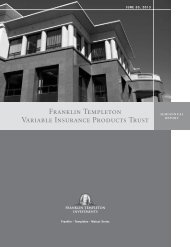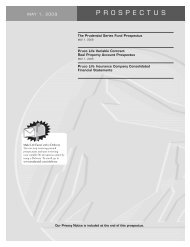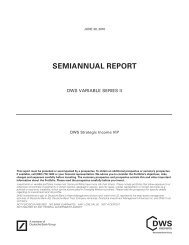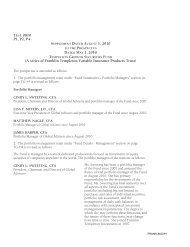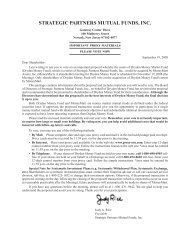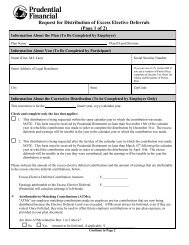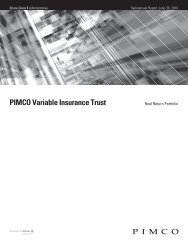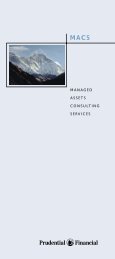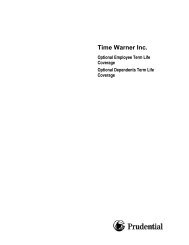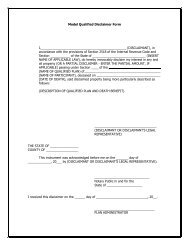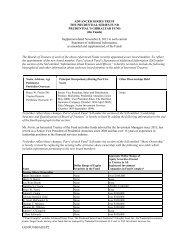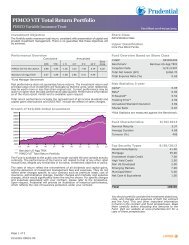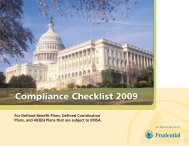Advanced Series Trust AST Academic Strategies Asset ... - Prudential
Advanced Series Trust AST Academic Strategies Asset ... - Prudential
Advanced Series Trust AST Academic Strategies Asset ... - Prudential
Create successful ePaper yourself
Turn your PDF publications into a flip-book with our unique Google optimized e-Paper software.
EAFE Index GD (gross dividends) version of the MSCI EAFE Index which does not reflect the impact of withholding taxes on<br />
reinvested dividends and generally reflects higher returns. These returns do not include the effect of any investment management<br />
expenses. These returns would have been lower if they included the effect of these expenses.<br />
MSCI Emerging Markets Index. The Morgan Stanley Capital International (MSCI) Emerging Markets Index is a free float-adjusted<br />
market capitalization index that is designed to measure equity market performance in the global emerging markets. The Portfolio<br />
utilizes the GD version of the Index. The ND (net dividends) and GD (gross dividends) versions of the Index differ in that ND returns<br />
reflect the impact of the maximum withholding taxes on reinvested dividends while the GD version does not reflect the impact of<br />
withholding taxes on reinvested dividends. These returns do not include the effect of any investment management expenses. These<br />
returns would have been lower if they included the effect of these expenses.<br />
MSCI World Index (GD). The Morgan Stanley Capital International (MSCI) World Index is a weighted index comprised of<br />
approximately 1,500 companies listed on the stock exchanges of the U.S., Europe, Australasia, and the Far East. The Portfolio utilizes<br />
the GD (gross dividends) version of the Index which does not reflect the impact of withholding taxes on reinvested dividends and<br />
generally reflects higher returns. These returns do not include the effect of any investment management expenses. These returns<br />
would have been lower if they included the effect of these expenses.<br />
NAREIT Equity REIT Index. The NAREIT Equity REIT Index is an unmanaged, capitalization-weighted index of all equity real estate<br />
investment trusts. These returns do not include the effect of any investment management expenses. These returns would be lower if<br />
they included the effect of these expenses.<br />
Dow Jones Wilshire REIT Index. The Dow Jones Wilshire REIT Index seeks to provide a broad representation of the U.S. real estate<br />
securities markets. In order to be included in the Index, a company must be an equity owner and operator of commercial or<br />
residential real estate and must generate at least 75% of its revenue from such assets. It also must meet minimum requirements for<br />
market capitalization and liquidity. Certain types of securities, such as mortgage REITs, are excluded, as are companies with more<br />
than 25% of their assets in direct mortgage investments. These returns do not include the effect of any investment management<br />
expenses. These returns would have been lower if they included the effect of these expenses.<br />
Russell 1000 Index. The Russell 1000 Index is an unmanaged index that consists of the 1,000 largest securities in the Russell 3000<br />
Index. These returns do not include the effect of any operating expenses of a mutual fund or taxes payable by investors and would be<br />
lower if they included these effects.<br />
Russell 1000 Growth Index. The Russell 1000 Growth Index contains those securities in the Russell 1000 index with an aboveaverage<br />
growth orientation. Companies in this index tend to exhibit higher price-to-book and price-to-earning ratios, lower dividend<br />
yields and higher forecasted growth rates. These returns do not include the effect of any operating expenses of a mutual fund or taxes<br />
payable by investors and would be lower if they included these effects. Source: Lipper Inc.<br />
Russell 1000 Value Index. The Russell 1000 Value Index measures the performance of those Russell 1000 companies with lower<br />
price-to-book ratios and lower forecasted growth values. These returns do not include the effect of any sales charges, operating<br />
expenses of a mutual fund or taxes. These returns would be lower if they included the effect of sales charges, operating expenses of a<br />
mutual fund or taxes.<br />
Russell Midcap Growth Index. The Russell Midcap Growth Index is a market value-weighted index that tracks those Russell Midcap<br />
companies with high price-to-book ratios and higher forecasted growth values. Index returns do not reflect deductions for sales<br />
charges, mutual fund operating expenses or taxes. Source: Lipper Inc.<br />
Russell Midcap Value Index. The Russell Midcap Value Index measures the performance of those Russell Midcap companies with<br />
lower price-to-book ratios and lower forecasted growth values. The stocks are also members of the Russell 1000 Value Index. These<br />
returns do not include the effect of any investment management expenses. These returns would have been lower if they included the<br />
effect of these expenses.<br />
Russell 2000 Index. The Russell 2000 Index measures the performance of the small-cap segment of the U.S. equity universe. The<br />
Index is a subset of the Russell 3000 Index representing approximately 10% of the total market capitalization of that index. It<br />
includes approximately 2000 of the smallest securities based on a combination of their market cap and current index membership.<br />
These returns do not include the effect of any investment management expenses, and would have been lower if they included the<br />
effect of these expenses.<br />
Russell 2000 Index. The Russell 2000 Index measures the performance of the small-cap segment of the U.S. equity universe. The<br />
Index is a subset of the Russell 3000 Index representing approximately 10% of the total market capitalization of that index. It<br />
includes approximately 2000 of the smallest securities based on a combination of their market cap and current index membership.<br />
These returns do not include the effect of any investment management expenses, and would have been lower if they included the<br />
effect of these expenses.<br />
374



